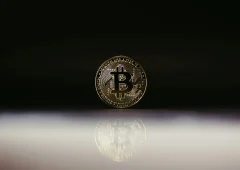Will Politics Be the Next Frontier for Crypto?
10.02.2025 8:00 1 min. read Alexander Stefanov
The head of CryptoQuant, a market intelligence firm, sees a major future role for crypto assets in politics.
Ki Young Ju recently shared his perspective with his followers on X, predicting that the political landscape will eventually integrate tokenized assets due to its inherently narrative-driven nature. He pointed to the emergence of Trump’s Official Trump (TRUMP) token as an early example of this trend.
According to Ki, digital assets thrive on compelling stories that attract capital and talent, creating decentralized internet-based communities. Politics, he argues, naturally fits this model since it is widely relatable, often provocative, and deeply polarizing.
He suggests that political parties could issue their own tokens, allowing supporters to invest in a way that strengthens their sense of belonging while also serving as a real-time measure of public sentiment.
Ki envisions a future where major political organizations launch their own tokens, with potential for exchange-traded funds (ETFs) tracking these assets. In his view, the Trump Coin is just the start of a much larger movement.
Ki also commented on the current state of the altcoin market, noting that only certain categories are performing well amid overall uncertainty. He highlighted that while infrastructure-related tokens like Ethereum have struggled, those linked to institutional interest, stablecoins, and meme coins have managed to remain resilient.
-
1
Here is Why the Fed May Cut Rates Earlier Than Expected, According to Goldman Sachs
08.07.2025 15:00 2 min. read -
2
What Brian Armstrong’s New Stats Reveal About Institutional Crypto Growth
29.06.2025 15:00 2 min. read -
3
Vitalik Buterin Warns Digital ID Projects Could End Pseudonymity
29.06.2025 9:00 2 min. read -
4
Donald Trump Signs “One Big Beautiful Bill”: How It Can Reshape the Crypto Market
05.07.2025 9:56 2 min. read -
5
Market Odds of a U.S. Recession in 2025 Drop in Half Since May
05.07.2025 18:30 2 min. read
BitGo Files Confidentially for IPO With SEC
BitGo Holdings, Inc. has taken a key step toward becoming a publicly traded company by confidentially submitting a draft registration statement on Form S-1 to the U.S. Securities and Exchange Commission (SEC).
Crypto Greed Index Stays Elevated for 9 Days — What it Signals Next?
The crypto market continues to flash bullish signals, with the CMC Fear & Greed Index holding at 67 despite a minor pullback from yesterday.
U.S. Public Pension Giant Boosts Palantir and Strategy Holdings in Q2
According to a report by Barron’s, the Ohio Public Employees Retirement System (OPERS) made notable adjustments to its portfolio in Q2 2025, significantly increasing exposure to Palantir and Strategy while cutting back on Lyft.
Key Crypto Events to Watch in the Next Months
As crypto markets gain momentum heading into the second half of 2025, a series of pivotal regulatory and macroeconomic events are poised to shape sentiment, liquidity, and price action across the space.
-
1
Here is Why the Fed May Cut Rates Earlier Than Expected, According to Goldman Sachs
08.07.2025 15:00 2 min. read -
2
What Brian Armstrong’s New Stats Reveal About Institutional Crypto Growth
29.06.2025 15:00 2 min. read -
3
Vitalik Buterin Warns Digital ID Projects Could End Pseudonymity
29.06.2025 9:00 2 min. read -
4
Donald Trump Signs “One Big Beautiful Bill”: How It Can Reshape the Crypto Market
05.07.2025 9:56 2 min. read -
5
Market Odds of a U.S. Recession in 2025 Drop in Half Since May
05.07.2025 18:30 2 min. read


